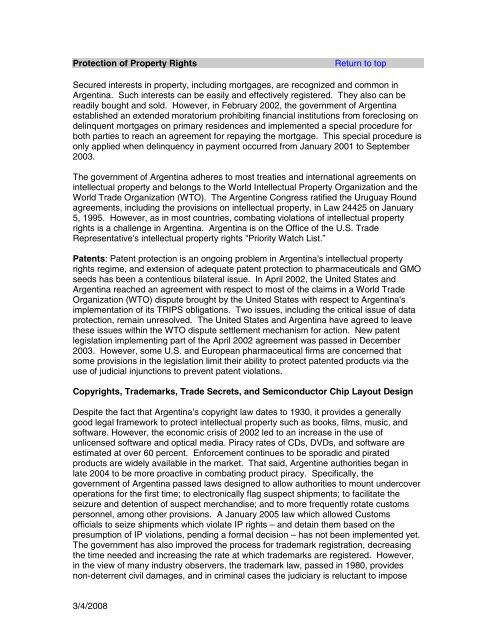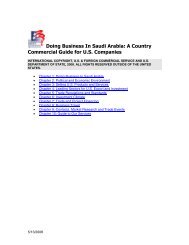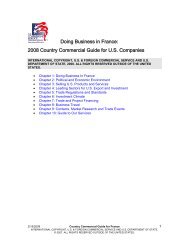You also want an ePaper? Increase the reach of your titles
YUMPU automatically turns print PDFs into web optimized ePapers that Google loves.
Protection of Property Rights Return to top<br />
Secured interests in property, including mortgages, are recognized and common in<br />
<strong>Argentina</strong>. Such interests can be easily and effectively registered. They also can be<br />
readily bought and sold. However, in February 2002, the government of <strong>Argentina</strong><br />
established an extended moratorium prohibiting financial institutions from foreclosing on<br />
delinquent mortgages on primary residences and implemented a special procedure for<br />
both parties to reach an agreement for repaying the mortgage. This special procedure is<br />
only applied when delinquency in payment occurred from January 2001 to September<br />
2003.<br />
The government of <strong>Argentina</strong> adheres to most treaties and international agreements on<br />
intellectual property and belongs to the World <strong>In</strong>tellectual Property Organization and the<br />
World Trade Organization (WTO). The Argentine Congress ratified the Uruguay Round<br />
agreements, including the provisions on intellectual property, in Law 24425 on January<br />
5, 1995. However, as in most countries, combating violations of intellectual property<br />
rights is a challenge in <strong>Argentina</strong>. <strong>Argentina</strong> is on the Office of the U.S. Trade<br />
Representative's intellectual property rights "Priority Watch List.”<br />
Patents: Patent protection is an ongoing problem in <strong>Argentina</strong>'s intellectual property<br />
rights regime, and extension of adequate patent protection to pharmaceuticals and GMO<br />
seeds has been a contentious bilateral issue. <strong>In</strong> April 2002, the United States and<br />
<strong>Argentina</strong> reached an agreement with respect to most of the claims in a World Trade<br />
Organization (WTO) dispute brought by the United States with respect to <strong>Argentina</strong>'s<br />
implementation of its TRIPS obligations. Two issues, including the critical issue of data<br />
protection, remain unresolved. The United States and <strong>Argentina</strong> have agreed to leave<br />
these issues within the WTO dispute settlement mechanism for action. New patent<br />
legislation implementing part of the April 2002 agreement was passed in December<br />
2003. However, some U.S. and European pharmaceutical firms are concerned that<br />
some provisions in the legislation limit their ability to protect patented products via the<br />
use of judicial injunctions to prevent patent violations.<br />
Copyrights, Trademarks, Trade Secrets, and Semiconductor Chip Layout Design<br />
Despite the fact that <strong>Argentina</strong>’s copyright law dates to 1930, it provides a generally<br />
good legal framework to protect intellectual property such as books, films, music, and<br />
software. However, the economic crisis of 2002 led to an increase in the use of<br />
unlicensed software and optical media. Piracy rates of CDs, DVDs, and software are<br />
estimated at over 60 percent. Enforcement continues to be sporadic and pirated<br />
products are widely available in the market. That said, Argentine authorities began in<br />
late 2004 to be more proactive in combating product piracy. Specifically, the<br />
government of <strong>Argentina</strong> passed laws designed to allow authorities to mount undercover<br />
operations for the first time; to electronically flag suspect shipments; to facilitate the<br />
seizure and detention of suspect merchandise; and to more frequently rotate customs<br />
personnel, among other provisions. A January 2005 law which allowed Customs<br />
officials to seize shipments which violate IP rights – and detain them based on the<br />
presumption of IP violations, pending a formal decision – has not been implemented yet.<br />
The government has also improved the process for trademark registration, decreasing<br />
the time needed and increasing the rate at which trademarks are registered. However,<br />
in the view of many industry observers, the trademark law, passed in 1980, provides<br />
non-deterrent civil damages, and in criminal cases the judiciary is reluctant to impose<br />
3/4/2008












